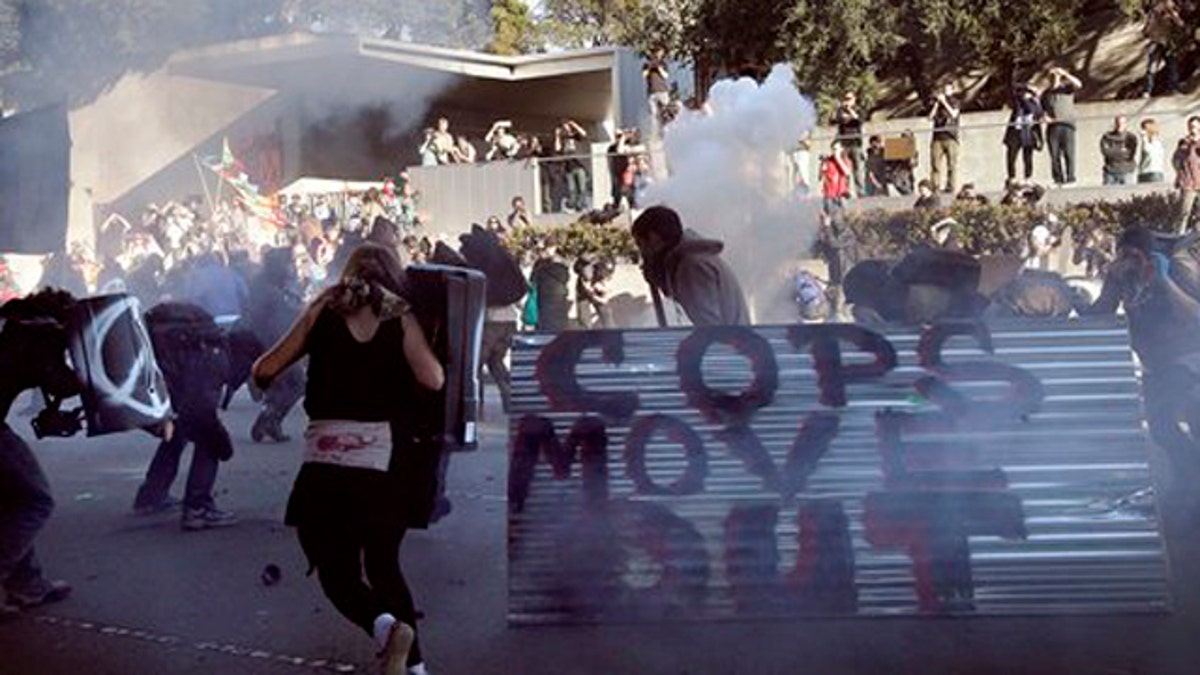
January 28, 2012: Oakland police deploy smoke and tear gas to stop protesters with the Occupy Oakland as they march through the streets of downtown Oakland, Calif. (AP)
U.S. Park Police on Monday enforced its push for Occupy protesters in the nation's capital to vacate two parks within sight of the White House or face arrest.
Sgt. David Schlosser, a Park Police spokesman, said the Park Police had begun enforcing the camping ban Monday by reminding demonstrators of the regulation and encouraging them to pack up their stuff at McPherson Square and Freedom Plaza, where protesters have been demonstrating for months. There were no arrests.
Schlosser declined to discuss a timeline for eviction or whether officers would return Monday night or Tuesday morning, though he said the camping ban pertained not only to sleeping on the grounds, but also to possessing bedding materials like blankets and pillows.
The camping ban in Washington comes as the city of Oakland, Calif., vows to keep out anti-Wall Street protesters it says are turning the city into their private playground. More than 400 people were arrested over the weekend in Oakland on charges ranging from failure to disperse to vandalism.
In Washington, D.C., the National Park Service has warned the protesters Friday at McPherson Square and at Freedom Plaza that those who violate the camping rule beginning Monday at noon will be subject to arrest.
The U.S. Park Police ordered sleeping bags, pillows and other gear be removed as part of the sleeping ban, but said tents may remain as a protest symbol if flaps stayed open, Reuters reported Monday.
The enforcement comes after a House oversight subcommittee hearing last week where Republican lawmakers questioned why the park service has allowed Occupy protesters to camp for months on federal land. National Park Service Director Jonathan Jarvis said protesters have a right to be in the park and won't be evicted, but they will be encouraged to sleep elsewhere.
In Oakland, meanwhile, more than 400 Occupy protesters were arrested during clashes on Saturday, police spokesman Sgt. Jeff Thomason said. At least three officers and one protester were injured.
Oakland officials vowed Sunday to be ready if Occupy protesters try to mount another large-scale demonstration. Protesters, meanwhile, decried Saturday's police tactics as illegal and threatened to sue.
Mayor Jean Quan personally inspected damage caused by dozens of people who broke into City Hall. She said she wants a court order to keep Occupy protesters who have been arrested several times out of Oakland, which has been hit repeatedly by demonstrations that have cost the financially troubled city about $5 million.
Quan also called on the loosely organized movement to "stop using Oakland as its playground."
"People in the community and people in the Occupy movement have to stop making excuses for this behavior," she said.
Saturday's protests -- the most turbulent since Oakland police forcefully dismantled an Occupy encampment in November -- came just days after the announcement of a new round of actions. The group said it planned to use a vacant building as a social center and political hub and threatened to try to shut down the Port of Oakland for a third time, occupy the airport and take over City Hall.
After the mass arrests, the Occupy Oakland Media Committee criticized the police's conduct, saying that most of the arrests were made illegally because police failed to allow protesters to disperse. It threatened legal action.
"Contrary to their own policy, the OPD gave no option of leaving or instruction on how to depart. These arrests are completely illegal, and this will probably result in another class-action lawsuit against the OPD," a release from the group said.
Deputy Police Chief Jeff Israel told reporters late Saturday that protesters gathered unlawfully and police gave them multiple verbal warnings to disband.
"These people gathered with the intent of unlawfully entering into a building that does not belong to them and assaulting the police," Israel said. "It was not a peaceful group."
This month, a court-appointed monitor submitted a report to a federal judge that included "serious concerns" about the department's handling of the Occupy protests. Police officials say they were in "close contact" with the federal monitor during the protests.
The national Occupy Wall Street movement, which denounces corporate excess and economic inequality, began in New York City in the fall but has been largely dormant lately. Oakland, New York and Los Angeles were among the cities with the largest and most vocal Occupy protests early on. The demonstrations ebbed after those cities used force to move out hundreds of demonstrators who had set up tent cities.
Caitlin Manning, an Occupy Oakland member, believes that Saturday's protest caught the world's attention.
"The Occupy movement is back on the map," Manning said Sunday. "We think those who have been involved in movements elsewhere should be heartened."
Click for more on this story from MyFoxDC.com
The Associated Press contributed to this report.

